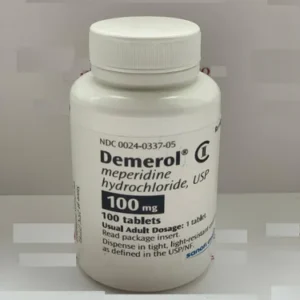Description
What is Vicodin?
Vicodin is also an opioid pain reliever. It contains hydrocodone and acetaminophen. It is used for severe, acute pain, and should only be used for a short period of time unless otherwise instructed by your healthcare provider.
Used for Pain
How Vicodin (hydrocodone / acetaminophen) works
Vicodin (hydrocodone / acetaminophen) is a combination of two medications that work together to treat pain.
-
Hydrocodone is an opioid. It attaches to certain mu-opioid receptors in your brain to lower how much pain you feel.
-
Acetaminophen is an analgesic. It blocks the production of certain chemicals in your brain that play a role in pain. As a result, acetaminophen helps relieve pain.
Drug Facts
What are the side effects of Vicotin (hydrocodone / acetaminophen)?
Common Side Effects
- Dizziness
- Sleepiness
- Nausea
- Vomiting
- Constipation
- Itching
Other Side Effects
- Headache
- Tiredness
- “Brain fog”
- Stomach pain
- Changes in blood pressure
Serious Side Effects
- Dangerously slow breathing: trouble breathing; bluish-colored lips, fingers, or toes
- Accidentally taking too much (overdose): not responding to sound or touch, slowed breathing, extreme sleepiness, cold or clammy skin, slow heartbeat, upper right-sided stomach pain, dark urine, yellowing of your skin or eyes
- Opioid withdrawal: anxiety, suicidal thoughts, restlessness, runny nose, yawning, sweating, chills, wide pupils, irritability
- Serious allergic reaction or skin reaction: rash, hives, blistering or peeling skin, shortness of breath, fast heartbeat, dizziness, feeling warm suddenly
Frequently asked questions about Vicodin (hydrocodone / acetaminophen)
Is Vicodin (hydrocodone / acetaminophen) an opioid?
Does Vicodin (hydrocodone / acetaminophen) have a risk for addiction?
Yes, opioid medications like Vicodin (hydrocodone / acetaminophen) have a risk for addiction. It’s one of the reasons why opioids are considered controlled substances. Addiction can happen as a result of misuse, or when a medication is used for non-medical reasons for its desirable physical or emotional effects. Signs of addiction include having cravings to use the medication, continuing to use the medication even though you have negative consequences from it, and having withdrawal symptoms when you stop taking it. Take opioid medications exactly as prescribed to you. Don’t change the dose or how often you take it without talking to your prescriber. Talk with your prescriber if you’re concerned about the risk for addiction.
Does Vicodin (hydrocodone / acetaminophen) make you sleepy?
How long does it take for Vicodin (hydrocodone / acetaminophen) to kick in?
What’s the difference between Vicodin (hydrocodone / acetaminophen) and Percocet (oxycodone / acetaminophen)?
What’s the difference between Norco and Vicodin?
Can I take Vicodin (hydrocodone / acetaminophen) if I’m pregnant?
Opioids like Vicodin (hydrocodone / acetaminophen) generally aren’t recommended during pregnancy unless the benefits are clearly greater than the risks. Taking opioids while you’re expecting can raise the risk of developmental and growth problems in your baby. Your unborn baby can become dependent on the opioid and then develop neonatal opioid withdrawal syndrome after they’re born. This is a serious, life-threatening problem that happens when your newborn baby has opioid withdrawal symptoms, like poor feeding and sucking behavior, abnormal sleep patterns, and possibly seizures.








Reviews
There are no reviews yet.